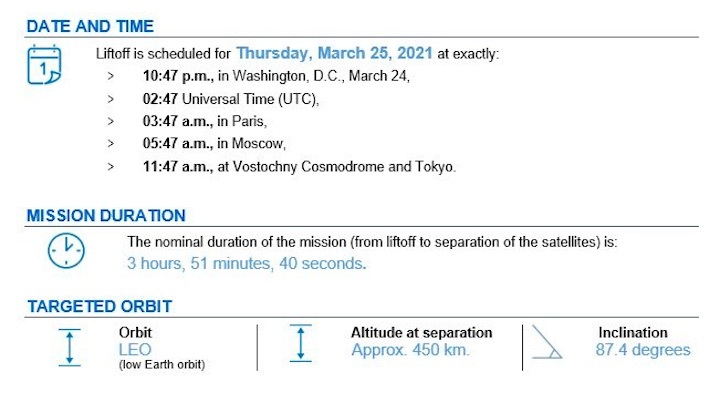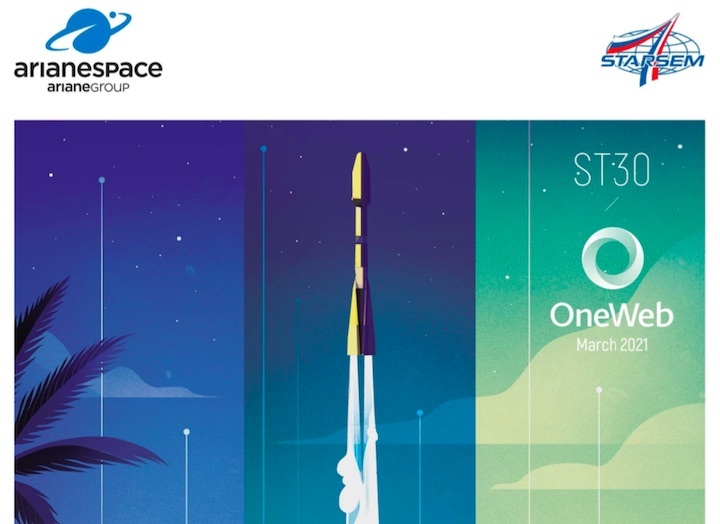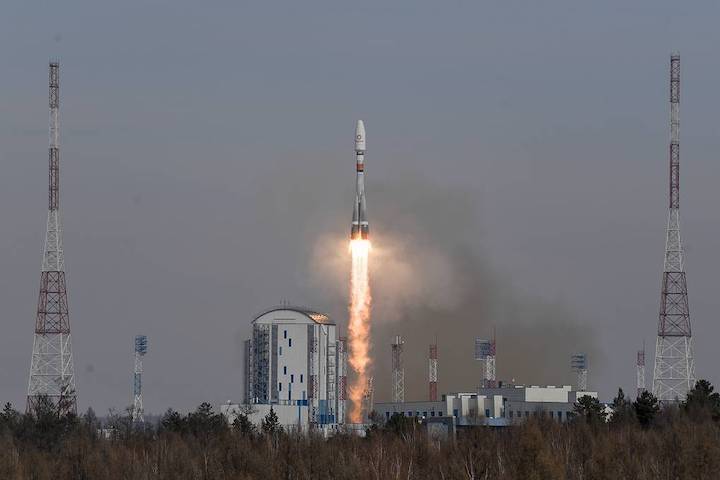RUAG Space AB (Linköping, Sweden) is the prime contractor in charge of development and production of the dispenser system used on Flight ST30. It will carry the satellites during their flight to low Earth orbit and then release them into space.
The dedicated dispenser is designed to accommodate up to 36 spacecraft per launch, allowing Arianespace to timely deliver the lion’s share of the initial OneWeb constellation.
Arianespace, Starsem and satellite constellations
With its current family of launchers (Ariane 5, Soyuz and Vega) and the future family (Ariane 6 and Vega C), Arianespace is a key player in the growth market of satellite constellations whether for navigation, telecommunications or Earth observation.
Indeed, since the late 1990s, Arianespace has launched a total of 241 commercial constellation satellites, including 56 for Globalstar, 30 for Planet, 20 for O3b, 12 for Swarm Technologies, eight for Spire, along with one each for Orbcomm, Satellogic, Kepler Communications, Orbital Solutions/GeoOptics and GHGSat; as well as 26 institutional satellites for the European Space Agency (ESA) and the European Commission as part of the Galileo constellation project.
Arianespace’s backlog, apart from the OneWeb constellation’s payloads, currently consists of 25 more constellation satellites to orbit on behalf of: Airbus Defence and Space (four); ESA and the European Commission (four), with eight more in reservations; Spire (two); Airbus Defence and Space on behalf of CNES (four); and three undisclosed payloads.
+++
Flight ST30: Arianespace to hit its stride with next OneWeb launch

The next Arianespace mission is planned from Vostochny Cosmodrome with Soyuz on March 25, to deliver 36 satellites into orbit.
By operating this fifth flight on behalf of OneWeb, Arianespace will bring the total fleet to 146 satellites in Low Earth Orbit. Arianespace is proud to share in the fulfilment of its customer’s ultimate ambition: providing internet access for everyone, everywhere.
Flight ST30, the second commercial mission performed by Arianespace and its Starsem affiliate from the Vostochny Cosmodrome, will put 36 of OneWeb’s satellites into a near-polar orbit at an altitude of 450 kilometers. The mission will have a total duration of three hours and 51 minutes and will include nine separations of four satellites, that will raise themselves to their operational orbit. This launch will bring up to speed Arianespace’s operations this year to the benefit of OneWeb, and will raise to 146 the number of satellites deployed for the global telecommunications operator.
OneWeb’s mission is to bring internet everywhere to everyone, by creating a global connectivity platform through a next generation satellite constellation in low Earth orbit. OneWeb’s constellation will deliver high-speed, low-latency connectivity services to a wide range of customer sectors including aviation, maritime, backhaul services, as well as governments, emergency response services and more. Central to its purpose, OneWeb seeks to bring connectivity to every place where fiber cannot reach, and thereby bridge the digital divide.
Once deployed, the OneWeb constellation will enable user terminals that are capable of offering 3G, LTE, 5G and Wi-Fi coverage, providing high-speed access globally – by air, sea and land.
OneWeb Satellites, a joint venture between OneWeb and Airbus Defence and Space, is the constellation’s prime contractor. The satellites were built thanks to its leading-edge satellite manufacturing process that can build up to two satellites a day on a series production line dedicated to the assembly, integration, and testing of the satellites.
A total of 110 OneWeb satellites have already been orbited by Arianespace: the first six were successfully orbited by Arianespace from French Guiana on February 27, 2019. On February and March 2020, Arianespace and its Starsem affiliate successfully launched 68 OneWeb satellites from Baikonur Cosmodrome on two successful Soyuz flights. On December 2020, the team successfully delivered an additional 36 satellites into orbit, with first commercial flight operated from new Vostochny Cosmodrome.
Quelle: arianespace
----
Update: 24.03.2021
.



